

Cyberculture. Cyberculture or computer culture is the culture that has emerged, or is emerging, from the use of computer networks for communication, entertainment, and business.
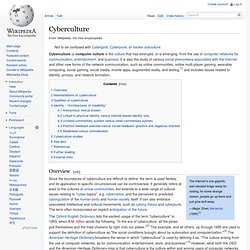
It is also the study of various social phenomena associated with the Internet and other new forms of the network communication, such as online communities, online multi-player gaming, wearable computing, social gaming, social media, mobile apps, augmented reality, and texting,[1] and includes issues related to identity, privacy, and network formation. Generation Z. Terminology[edit] USA Today sponsored an online contest for readers to choose the name of the next generation after the Millennials.
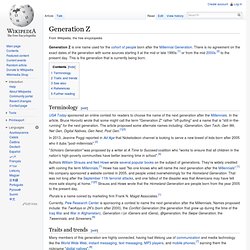
In the article, Bruce Horovitz wrote that some might call the term "Generation Z" rather "off-putting" and a name that is "still in-the-running" for the next generation. The article proposed some alternate names including: iGeneration, Gen Tech, Gen Wii, Net Gen, Digital Natives, Gen Next, Post Gen.[1][3] In 2013, Jeanine Poggi reported in Ad Age that Nickelodeon channel is looking to serve a new breed of kids born after 2005 who it dubs "post-millennials".[2] "Scholars Generation" was proposed by a writer at A Time to Succeed coalition who "works to ensure that all children in the nation’s high-poverty communities have better learning time in school".[4] Authors William Strauss and Neil Howe wrote several popular books on the subject of generations.
Plurals is a name coined by marketing firm Frank N. Traits and trends[edit] See also[edit] References[edit] Millennials. Terminology[edit] Authors William Strauss and Neil Howe wrote about the Millennials in Generations: The History of America's Future, 1584 to 2069,[2] and they released an entire book devoted to them, titled Millennials Rising: The Next Great Generation.[3] Strauss and Howe are "widely credited with naming the Millennials" according to journalist Bruce Horovitz.[1] In 1987, they coined the term "around the time 1982-born children were entering preschool and the media were first identifying their prospective link to the millennial year 2000".[4] Strauss and Howe use 1982 as the Millennials' starting birth year and 2004 as the last birth year.[5] Newsweek used the term Generation 9/11 to refer to young people who were between the ages of 10 and 20 years on 11 September 2001.
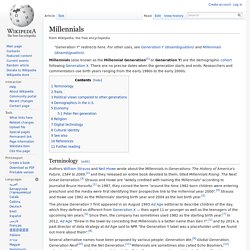
The first reference to "Generation 9/11" was made in the cover story of the November 12, 2001 issue of Newsweek.[17] Traits[edit] William A. Political views compared to other generations[edit] Are There Internet Dialects? Viral Journalism and the Valley of Ambiguity. How much does search engine optimization play into how effectively a story is picked up virally?
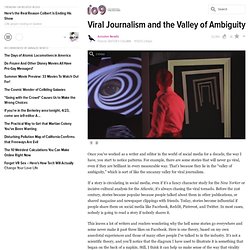
If a story contains rhetoric that is more likely to get passed on, even if it's "important" — famous names, scandal — does that play a role? Take recaps, here and elsewhere: I'm slowly drifting away from them because they seem to be increasingly simple plot recounts that go over the sexy sexiness of sexy sex and the fabulous fabulousness of fabulous fabulousness. Based on reads and short, quipy comments, I'd assume those are more popular than deep-dives that try to answer "so what? " questions. (Maybe that was always the case and I'm just becoming jaded, but especially in the past year recaps seem to leave me knowing less about a show than more.) Although recaps of the former type might be pop culture cotton candy, I can see how they'd be more likley to be shared than a close reading of a shot sequence.
The Future. 4 Reasons Being a Pop Culture Nerd is Harder Than You Think. #2.

Militant Sects of Pop Culture Nerds Photos.com Minutes after finishing the latest book in the series that spawned HBO's Game of Thrones, I bathed myself in long-awaited fan theories and general discussion in the A Song of Ice and Fire subreddit. Are we living in the Golden Age of Trash Culture right now? As hard as it is to believe, from what I've read recently porn appears to be basically dead.
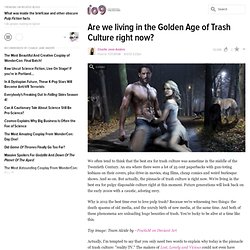
Sure, there's plenty of it on the internet, but it's either pirated from DVDs made during its peak, it's amateurs exhibiting sex for free, or it's desperate porn actors making about a tenth (no kidding) what they did a few years ago before the bottom dropped out of the business. There are folks making some money on the side, but it's not enough to be a day job. Porn is part of the Old Media. Who would have guessed? Oh, and those BtVS XXX and Flintstones XXX movies? Wow. I ponder the deeper meaning in this (because being so old I'm a brain in a jar, that's more interesting than the porn itself).
Porn has always led the way in adoption of new technologies. If I'd had to make a guess, I would have guessed that any business based on vices would do well: drugs, alcohol, tobacco, porn, etc.